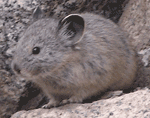
The only way is up for the American Pika as it seeks to adjust to global warming. Very sensitive to hot temperatures, their 1,200 years migration from the great American plains has found them in alpine terrain, the windswept no-man's-land above tree line, in search of their ideal cooler temperatures. This from National Wildlife Magazine entitled "No Room at the Top".
The extinction of the pika will be another harbinger of global warming.But biologists like [Chris] Ray now fear that these hearty creatures may not survive global warming. Unlike many wildlife species that are shifting their ranges north or to higher altitudes in response to changing climate, pikas and other alpine animals have nowhere else to go. In some locations, entire pika populations already have disappeared. Scientists say the animal's decline, like the proverbial canary in a coal mine, may presage problems for other species, from butterflies and birds to large mammals.
In the Great Basin, the arid region between the Rocky Mountains and California's Sierra Nevada, pikas already are disappearing. According to National Park Service biologist Erik Beever, the mammals have recently disappeared from 8 of 25 mountainous locations where they were documented in the early 1900s. Beever, who published his discovery in the Journal of Mammalogy, says the die-off indicates that suitable habitat is shrinking. Notably, the most recent pika losses occurred at the warmer, southern end of the animals' range. "This is what you would expect from rising temperatures, a loss at the margins of their distribution," says Beever. The finding represents "one of the first contemporary examples of a North American mammal exhibiting a rapid shift in distribution due to climate."
 Global Warning Climate Change Environment Biology Harbinger Carbon Sink Earth United States Temperatures Extinction Biodiversity
Global Warning Climate Change Environment Biology Harbinger Carbon Sink Earth United States Temperatures Extinction Biodiversity




No comments:
Post a Comment